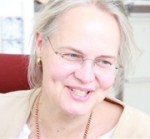(See English below)
 Föstudaginn 19. apríl flytur Catherine Campbell, prófessor í félagssálfræði við London School of Economics, fyrirlestur sem ber heitið „Hvernig má virkja valdaminni hópa til að koma á félagslegum breytingum“ [“Mobilising disadvantaged groups: towards new understandings of social change?”]. Fyrirlesturinn fer fram á ensku í fyrirlestrasal Þjóðminjasafnsins, kl. 12:00-13:00.
Föstudaginn 19. apríl flytur Catherine Campbell, prófessor í félagssálfræði við London School of Economics, fyrirlestur sem ber heitið „Hvernig má virkja valdaminni hópa til að koma á félagslegum breytingum“ [“Mobilising disadvantaged groups: towards new understandings of social change?”]. Fyrirlesturinn fer fram á ensku í fyrirlestrasal Þjóðminjasafnsins, kl. 12:00-13:00.
Í fyrirlestrinum mun Catherine Campbell fjalla um af hverju forsendur fyrir bættu heilsufari valdaminni hópa, á borð við konur, fatlaða og atvinnulausa, sé að þeir hafi pólitískt vægi og aðgang að efnahagslegum úrræðum. Þá mun hún gera grein fyrir þeim kenningum sem oft liggja að baki hugmyndum um félagslegar breytingar og fjalla um mikilvægi þess að þær séu dregnar fram og endurhugsaðar. Hún mun einnig reifa hugmyndir um hvernig hægt er að breyta ójöfnum valdatengslum í félagslegu umhverfi og gera samfélagið móttækilegra fyrir þörfum valdaminni hópa.
Catherine Campbell hefur í rannsóknum sínum lagt áherslu á lýðheilsu og hvernig hægt er að virkja samfélög til að auka velferð og bæta heilsufar. Þá hefur hún beint sjónum að því hvernig hægt er að tryggja þátttöku grasrótarsamtaka í þróunarlöndum í ákvarðanatökuferlum þannig að þau komi jaðarhópum til góða, einkum þegar kemur að sjúkdómum á borð við HIV/alnæmi. Hún hefur einnig skoðað hvað þarf til að herferðir gegn t.d. HIV/alnæmi beri árangur. Catherine Campbell hefur ritað fjölda greina, bókakafla og bóka, m.a. Letting them die: why HIV/AIDS preventions programmes fail.
Fyrirlesturinn er haldinn í samstarfi við Þjóðminjasafn Íslands, LSE félagið á Íslandi og Alþjóðlega jafnréttisskólann við HÍ.
Öll velkomin!
English:
Mobilising disadvantaged groups: towards new understandings of social change?
On Friday 19 April 2013, Catherine Campbell, Professor of Social Psychology and Director of the Health, Community and Development Group, London School of Economics, will give a public talk entitled “Mobilising disadvantaged groups: towards new understandings of social change?” The lecture will be held at the National Museum, Lecture Hall, at 12:00-13:00. The lecture is hosted by the Centre for Women’s and Gender Research, University of Iceland, in collaboration with the GEST Programme and the LSE Alumni in Iceland.
Abstract:
Redistributive social policies – increasing peoples’ access to economic resources and political recognition – are a necessary condition for improving the health of excluded communities. However, social elites seldom give up economic or political power in the absence of assertive demands from less powerful groups. Against this background, critical community health psychologists have defined their role as working with marginalised groups (such as women, the disabled, the unemployed) to develop their capacity to resist and transform unequal social relations. Despite working long and hard, however, some argue that we are making less progress than we had hoped. This paper will argue that we have become so caught up in small-scale local activism that we have neglected two vital challenges. Firstly, we have focused too one-sidedly on projects to build the ‘voice’ of the poor and marginalised, neglecting the parallel need to build ‘receptive social environments’ where the powerful are likely to heed these voices. Secondly, we have too often neglected to clearly articulate, and update, the implicit theories of social change that inform our work, assuming rather than problematizing the links between our own community development work and wider social change. This keynote paper seeks to generate discussion about: (i) the implicit theory of change underpinning critical community health psychology; (ii) some of the dead ends that bedevil our practice, pointing to a need for theoretical renewal; and (iii) exploring how we might draw on current debates about ‘the future of the left’ to update our understandings of the pathways between community mobilisation and social change.
About the speaker:
Catherine Campbell is a Professor of Social Psychology at the London School of Economics, where she directs the MSc in Health, Community and Development. A South African by birth, she has a particular interest in the potential for collective action – both by local communities and global social movements – to facilitate health-enhancing social change. She explores these issues in the fields of HIV/AIDS and mental health. She was recently awarded the American Sociological Associations SAN’s award for her career contribution to understanding the social dynamics of HIV/AIDS, and is a Fellow of the British Psychological Society. Much of her research has had a gender focus, looking at both women and at men. She has a history of involvement in setting up Gender Research Groups in both South Africa and the UK, where she was one of the founding members of the LSE Gender Institute.